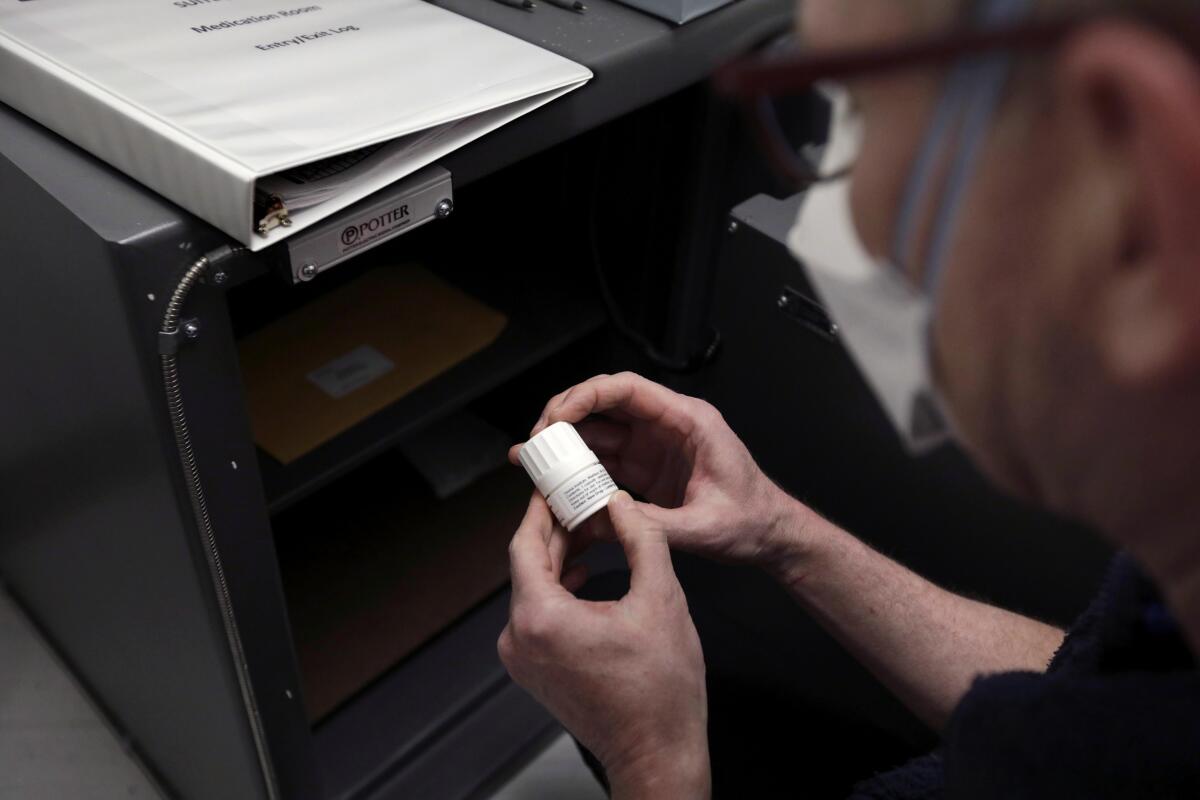Bill could end holdup for California research on psychedelics and addiction treatment

California lawmakers could soon clear a governmental logjam that has held up dozens of studies related to addiction treatment, psychedelics or other federally restricted drugs.
The holdup revolves around the Research Advisory Panel of California, established decades ago to vet studies involving cannabis, hallucinogens and treatments for “abuse of controlled substances.”
It has been a critical hurdle for California researchers exploring possible uses of psychedelics or seeking new ways to combat addiction. Scientists cannot move forward with such research projects without the panel’s blessing.
The panel had long met behind closed doors to make its decisions, but concerns arose last year that it was supposed to fall under the Bagley-Keene Act, a state law requiring open meetings. Holding those meetings in public, however, raised alarm about exposing trade secrets and other sensitive information.
So the panel stopped meeting at all. It has not convened since August. Meetings ordinarily scheduled for every other month have been canceled since October.
The result has been a ballooning backlog: As of early May, there were 42 new studies and 28 amendments to existing projects awaiting approval, according to state officials.
In California, where the herbal substance kratom has become a common fixture in vape-and-smoke shops, lawmakers are now aiming to reel in an unregulated market.
Ziva Cooper, director of the UCLA Center for Cannabis and Cannabinoids, said she had submitted one study to the California panel over a year ago — one already approved by the National Institutes of Health, the Food and Drug Administration, and an institutional review board. That research will assess the health risks of cannabis for seniors and young adults ages 18 to 25, two groups whose cannabis use has been on the rise, she said. Cooper said the panel sought a small change: adjusting two words in a consent form for study participants. But because the panel has not been meeting, she has been unable to proceed.
The holdup has also snarled two other studies her UCLA center had submitted to the panel — one examining whether cannabis could be used as an alternative to opioids for pain relief, another on whether a psychedelic compound found in mushrooms, psilocybin, could help treat people struggling with cocaine addiction.
And Cooper said she hasn’t even bothered to submit three more studies, including research on the effects of high-potency cannabis. The holdup has left Cooper and other researchers fearing they could lose funding for planned studies or be forced to lay off staff.
The idea of having to study something different because “in California I can’t do the research that I’m trained to do ... is demoralizing,” Cooper said. It aggravates her “to not be able to answer the questions that are desperately needed right now” as the range of cannabis products on the market has grown.
The standstill “has broad implications, costing researchers money in expired grants and contingent grants, shortened patents on new drugs, lost wages for research personnel, lost talent, and lost costs of research drugs for human use that will expire before use,” according to an analysis prepared for a state committee.
That long hiatus could soon end: Under Assembly Bill 2841, the state panel would be able to hold closed sessions to discuss studies that involve trade secrets or other proprietary information. The bill, proposed by Assemblymember Marie Waldron (R-Valley Center), would go into effect immediately if signed by the governor.
“We are focused on reactivating the large amount of research studies that have been on hold for over a year now,” Waldron said in a statement. “This is the quick and urgent solution needed to address that problem.”
A Los Angeles County initiative called Reaching the 95% aims to engage with more people than the fraction of Angelenos already getting addiction treatment.
The bill is supported by the nonprofit Veterans Exploring Treatment Solutions, which supports research into the possible benefits of psychedelics for treating depression and other conditions among military veterans and helps them obtain such treatment abroad.
“Psychedelic research has ground to halt in California — including numerous VA studies, “ said its director of public policy, Khurshid Khoja. If the Legislature does not act swiftly, the state will see “a rapid exodus of skilled researchers from California universities and research institutions to pursue their critically important work elsewhere — not to mention capital flight by funders who’ll deploy research dollars outside the state.”
“AB 2841 is an urgently needed response to address this crisis,” Khoja said.
To many researchers, however, AB 2841 does not go far enough. Dozens of scientists have called for the panel to be eliminated, arguing that even when it was meeting regularly, it was an unnecessary obstruction to research already being scrutinized by other government and institutional reviewers.
In a letter to Gov. Gavin Newsom, a coalition of researchers argued that undergoing the state review could delay a study by at least five months, resulting in more than $100,000 in “unnecessary staff expenditures” in that time. Because other states don’t have that hurdle, they argued, California researchers are losing out on competitive funding — and Californians miss chances to participate in local trials for emerging treatments.
A rare condition called hallucinogen persisting perception disorder has puzzled researchers and raised alarms as psychedelics go mainstream.
UCLA psychologist and addiction researcher Steven Shoptaw called it “an unequal burden on addiction research” compared with other scientific studies.
The California panel has been vetting not only studies that involve federally restricted drugs, but also those assessing any kind of medication to treat addiction, said Dr. Phillip Coffin, a UC San Francisco professor of medicine who has called to eliminate the panel.
“If I’m testing Prozac for depression, or Prozac for any other disease, I can do my research without waiting” for the committee, he said, but “If I’m testing Prozac for addiction, I have to wait.” By maintaining such barriers, Coffin argued, “we are seriously harming any chance California has of responding to the addiction crisis.”
Short of eliminating the panel, some have also argued for amending the law to exempt any researchers who have gotten federal approval to do such research.
Others have argued that the panel has a valuable role, even for studies that have undergone review by the FDA or other entities. An analysis of AB 2841 prepared for the Assembly Committee on Health said state data from the Department of Justice show that the Research Advisory Panel regularly catches issues with drug safety, consent forms missing important information about safety and privacy, and other potential problems.
The panel “has a record of providing an extra level of protection, which is important given the volume of controlled substance research that occurs in California,” the analysis said. In addition, the committee analysis said the panel is “the only one which ensures that studies conducted in California comply with state law.”
Coffin disputed such arguments, saying that in his experience and that of many other researchers, its feedback had not “improved patient safety or remotely justified the extreme delays.”
If it is truly finding problems that have escaped other reviewers, he argued, “then all research — not just addiction treatment and controlled substances — should be forced to go through this panel.”
How will the DEA’s decision to reclassify marijuana affect California’s ailing pot industry?











